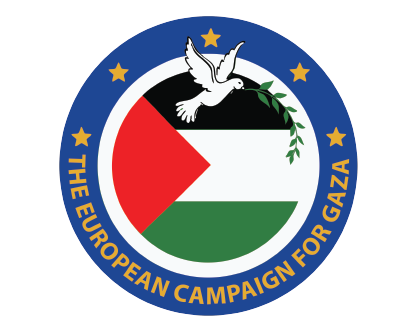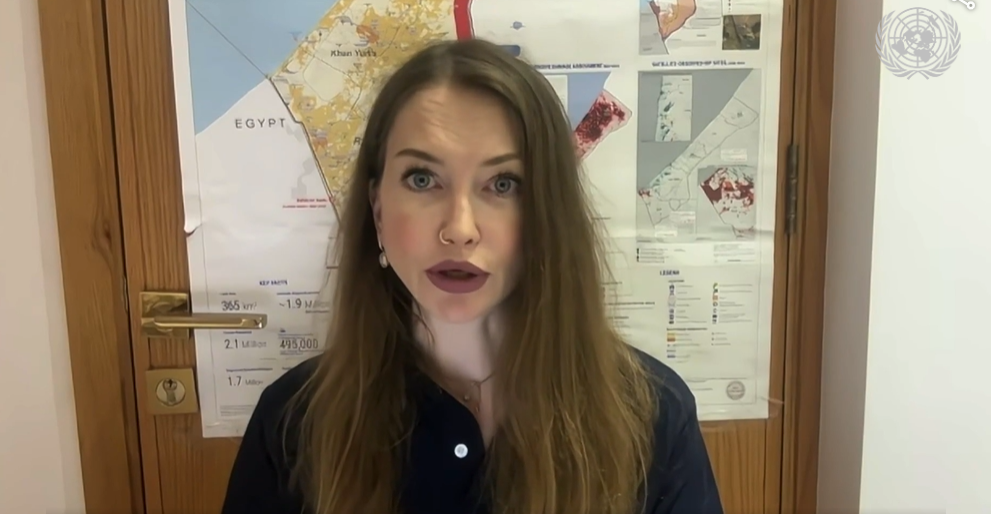


When Gaza burned, its children starved, and its hospitals collapsed—did you act?
Olga Cherevko, Spokesperson for the United Nations Office for the Coordination of Humanitarian Affairs in Gaza
September 12, 2025
In a single moment on this Tuesday, Gaza City received a death sentence: leave or be killed. Hundreds of thousands of civilians, exhausted, exhausted, and terrified, were ordered to flee into an area already so densely populated that even small animals must scramble for space to move. Hospitals shelter patients in their corridors and balconies, and where clean water, nutritious food, and life are no longer basic rights, but commodities so scarce that most people can only dream of attaining them one day, if they have a chance of surviving the bombardment.
To the west—the sea, besieged by Israeli warships, its ominous waves engulfing shabby tents at high tide. To the east, north, and south—ground forces Tanks continue to tighten their grip on the shrinking spaces, while drones and fighter jets hover over people's heads, their deafening sound forever etched in the memory—a warning that nowhere is safe. A dear friend texted me yesterday saying, "I tried to find a place for myself in the south, but there isn't any space." His eight-year-old cousin was killed, along with several other children, in an Israeli airstrike last week as they waited for their bread to bake. His daughter just turned two—and for two short years of her life, she has known nothing but war. When a bomb falls nearby, she runs to hide under a table in the community kitchen where her father works, where he continues to feed thousands every day, providing nourishment and hope to those who have lost everything. Gaza doesn’t need pity. Gaza needs an end to this horrific violence. The unmistakable stench of death wafts from every nook and cranny—a painful reminder that beneath the rubble that lines the streets hides the remains of mothers, fathers, and children. People who once laughed, cried, and dreamed. War has taken their lives with its deadly weapons, and many will never be found. On our way back to Gaza yesterday, we walked along roads that were barely passable. It's easy to navigate, and people crowd around our convoy, looking broken and begging for an end to this horror. A little girl walking beside her father waved at us as we passed. Will she survive this hell? Do world leaders, who have the power to stop this war, consider her worthy of peace? Her life hangs in the hands of those who choose to act. People's dignity and hope are stripped away with every loss of a loved one, with every airstrike targeting a civilian lifeline, and every time aid is denied access. The systems that hold lifelines have been systematically undermined and destroyed. Parents struggle to protect their children from violence, hunger, and fear. The streets are filled with families who have fled their homes, clutching their young children, unsure of where to go after all their options seem to have been exhausted. The race against time, against death, and against the spread of famine, We humanitarian workers feel that our efforts and work are in vain. The tragedy is compounded by the repeated blocking, delaying, and obstruction of humanitarian convoys by Israeli authorities.
Yet, even amidst this suffering, the light of humanity shines through. Palestinian doctors, nurses, and paramedics work around the clock despite being denied wages and often lacking medicine and electricity. Aid workers from UN agencies, the Red Crescent, and local and international NGOs continue to deliver food, medicine, and clean water despite the bombardment. Ordinary people share what little they have with those they don't know. In every act of care, there is a refusal that prevents cruelty from shaping the future. This is proof that the human spirit survives even in the darkest of darkness.
People often ask me if I have any hope left. Hope may be all we have left, and we should. We care for it and nurture it. The silence of exhaustion must not silence the voices of those gripped by this nightmare. Their stories of loss, resilience, and unquenchable hope must be told. When a Palestinian child draws a heart with her hands when we meet, or when a mother allows me to hold her precious child, or when a grandfather tells me that the work we do here is important and valuable, I know that hope lives on and is renewed forever. But hope alone does not guarantee people’s survival. Urgent decisions are needed that must pave the way to a lasting peace before it is too late. Voices that can silence the bombs are needed. Measures to stop the bloodshed are needed. An immediate and sustainable ceasefire is needed. The immediate and unconditional release of all hostages who have endured horrific suffering, as well as all those arbitrarily detained, is needed. The protection of all civilians wherever they are in Gaza, and the provision of unrestricted humanitarian access are needed. This includes access to the north, the flow of aid through all crossings and corridors, and accountability. The laws of war are not an option. Violations of these laws must be investigated and addressed, for the sake of justice and to prevent a dangerous precedent. The people of Gaza are not asking for charity; they are demanding their right to a life of safety, dignity, and peace.
Our collective humanity—yours, mine, and the humanity of each one of us—demands that we act now.
History will not judge us by the speeches we give, but by the actions we take. Did you act when Gaza was burning, its children were starving, and its hospitals were collapsing?
On this day, and every day, there is a new opportunity for the international community to translate its words into action. Don't waste this chance, because it may be the last.
Thank you